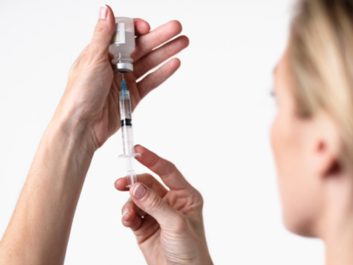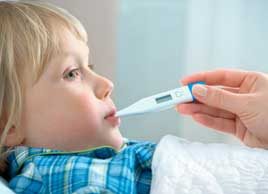
Influenza
Millions of Canadians are affected by the influenza virus each year. The flu shot (Influvac, Fluviral, Agriflu, Fluad, Vaxigrip, Flumist, Fluzone) protects against new strains of the virus, which can be especially dangerous for children, the elderly, or those with conditions such as heart or lung disease.
Deepali Kumar, an associate professor of medicine in the Division of Infectious Diseases and Multi-Organ Transplant Program at the University Health Network in Toronto, and a member of the National Advisory Committee ?on Immunization, recommends getting the flu shot as soon as it becomes available in the fall. “The peak is usually December and January, but flu season can start in November.” She adds that, like all vaccines, the flu shot takes at least two weeks to become effective.

Pneumococcal
Pneumococcal disease can lead to pneumonia or meningitis, or cause infections in the bloodstream. A one-time vaccine (Pneumovax 23, Pneumo 23) is indicated for people over age 65, and those with specific conditions such as diabetes, cancer or chronic heart, lung, kidney or liver disease should get a booster after five years.

Td or Tdap (tetanus and diphtheria; pertussis)
Canadians receive tetanus and diphtheria (Td) immunization as babies, and the booster as adolescents or adults. It’s recommended that adults receive a Td booster (called Td Absorbed) every 10 years. If you’re due for a booster and have never received immunization for pertussis-commonly known as whooping cough-it’s recommended that you get the Tdap vaccine (Adacel, Boostrix), which covers all three. “Immunity in general has decreased over time,” explains Kumar. “And since pertussis is on the rise in Canada, it’s recommended that you get a Tdap booster.” You get the Tdap vaccine just once for lifelong immunity against pertussis.

Varicella (chickenpox)
You do not require a vaccine against the varicella-zoster virus if you received it as a child, or if you have ever had chickenpox. Kumar cautions that before you get the vaccine (Varivax III, Varilrix, Priorix-Tetra), you must have been diagnosed by a healthcare provider as not having had chickenpox. You can get a blood test done if you’re not sure. If you require the shot, it is administered in two doses, six weeks apart.

Herpes zoster (shingles)
Shingles is a painful viral infection that’s characterized by an itchy, blistering rash, usually across the chest and abdomen. It is caused by the same virus that causes chickenpox. “Once you have chickenpox, the virus will remain latent in your body’s nerve roots,” explains Kumar. You likely won’t get it again, but as you get older and/or your immunity declines, the virus can reactivate as shingles. The vaccine (Zostavax) has been shown to reduce the risk of shingles by about 50 percent. It’s indicated for people over 50.

Meningococcal disease
This is a severe bacterial infection that could be life-threatening. The disease can cause meningitis, an infection of the fluid that surrounds the brain and the spinal cord. According to Kumar, the meningococcal vaccine (Meningitec, Menjugate, NeisVac-C, Menactra, Menveo) is recommended for adults in high-risk situations, which include military personnel, lab personnel who are routinely exposed to the bacteria that cause meningitis, and those travelling to an area of the world where meningococcal disease is common.

MMR (measles, mumps, rubella)
Most Canadians received the MMR vaccine as children. That’s all you need for lifelong immunity. If you’re not sure whether you have been inoculated, there is a blood test to confirm immunity. (Kumar cautions, however, that the test can produce false negatives). If you missed out on the vaccine (Priorix-Tetra, Priorix, M-M-R II), it’s recommended that you receive one dose if you were born after 1970, or two doses (taken one month apart) if you frequently travel outside North America, or are a healthcare worker, student or in the military.

HPV (Human papillomavirus)
This is the most common sexually transmitted infection. Most people with HPV never develop symptoms or health problems, but certain types of the virus are associated with genital warts and cervical cancer. You can protect yourself against certain strains of HPV through immunization. There are two types of the vaccine available in Canada-Gardasil, which is approved for females age nine to 45, and Cervarix, which is approved for females 10 to 25 only. The vaccine is administered in three doses over six months.

Travel vaccines
Recommended vaccines can vary by destination, age or other factors, so Kumar advises visiting a travel health clinic or your doctor as soon as you know your travel dates. “It’s important to plan, and the sooner you visit a clinic, the better.” That way, you have enough time to get any vaccines you may need against certain diseases-from hepatitis to tuberculosis, and others-as well as take other health and safety precautions. For more information, go to travelhealth.gc.ca.
Related:
• Should you get the flu shot?
• 9 ways to boost your immunity
• The vaccinations you may need as an adult
